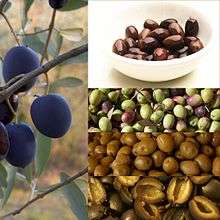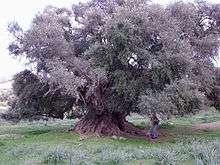oliva
English
Noun
oliva
- (anatomy) olivary body
- 1998, R. Nieuwenhuys, Hendrik Jan Donkelaar, Charles Nicholson, The Central Nervous System of Vertebrates: With Posters (page 1562)
- The medial part of the ventral lamina forms the most rostral pole of the oliva, the dorsal lamina the most caudal one.
- 1998, R. Nieuwenhuys, Hendrik Jan Donkelaar, Charles Nicholson, The Central Nervous System of Vertebrates: With Posters (page 1562)
Catalan
Etymology
From Old Occitan [Term?], from Latin olīva.
Pronunciation
Further reading
- “oliva” in Diccionari de la llengua catalana, segona edició, Institut d’Estudis Catalans.
Czech
Pronunciation
- IPA(key): /ˈolɪva/
Declension
References
- oliva in Jiří Rejzek, Český etymologický slovník, electronic version, Leda, 2007
Galician
Etymology
From Old Portuguese [Term?], from Latin olīva.
Italian

Olive (olives)
Alternative forms
Etymology
From Latin olīva, from Etruscan 𐌄𐌋𐌄𐌉𐌅𐌀 (eleiva) or from Proto-Greek *ἐλαίϝα (*elaíwa) (compare Mycenaean 𐀁𐀨𐀷 (e-ra-wa), Ancient Greek ἐλαία (elaía)), from Proto-Indo-European *h₁loiwom.
Pronunciation
Audio (file)
Related terms
Latin

olivae (olives)

oliva (olive tree)
Etymology
From Etruscan 𐌄𐌋𐌄𐌉𐌅𐌀 (eleiva) or from Proto-Greek *ἐλαίϝα (*elaíwa) (compare Mycenaean 𐀁𐀨𐀷 (e-ra-wa), Ancient Greek ἐλαία (elaía)), from Proto-Indo-European *h₁loiwom (compare Old Church Slavonic лои (loi, “tallow”), Old Armenian եւղ (ewł, “oil”)).(Can this(+) etymology be sourced?)
Pronunciation
- (Classical) IPA(key): /oˈliː.wa/, [ɔˈliː.wa]
- (Ecclesiastical) IPA(key): /oˈli.va/, [oˈliː.va]
Audio (Classical) (file)
Noun
olīva f (genitive olīvae); first declension
- an olive (fruit)
- an olive tree
- (poetic) an olive branch
Inflection
First declension.
| Case | Singular | Plural |
|---|---|---|
| Nominative | olīva | olīvae |
| Genitive | olīvae | olīvārum |
| Dative | olīvae | olīvīs |
| Accusative | olīvam | olīvās |
| Ablative | olīvā | olīvīs |
| Vocative | olīva | olīvae |
Related terms
Descendants
Anagrams
References
- oliva in Charlton T. Lewis and Charles Short (1879) A Latin Dictionary, Oxford: Clarendon Press
- oliva in Charlton T. Lewis (1891) An Elementary Latin Dictionary, New York: Harper & Brothers
- oliva in Harry Thurston Peck, editor (1898) Harper's Dictionary of Classical Antiquities, New York: Harper & Brothers
Middle English
Romansch
Slovak
Pronunciation
- IPA(key): /oliva/
Noun
oliva f (genitive singular olivy, nominative plural olivy, genitive plural olív, declension pattern of žena)
- olive (fruit)
Declension
Spanish
Pronunciation
- IPA(key): /oˈliba/, [oˈliβa]
Related terms
This article is issued from
Wiktionary.
The text is licensed under Creative
Commons - Attribution - Sharealike.
Additional terms may apply for the media files.